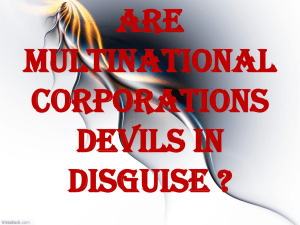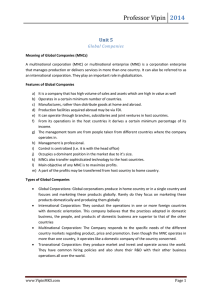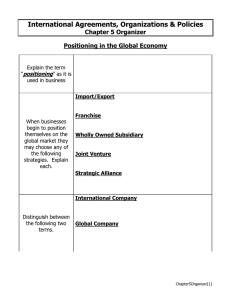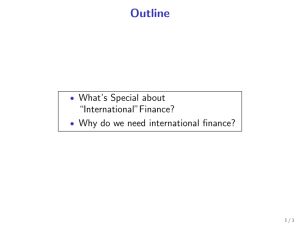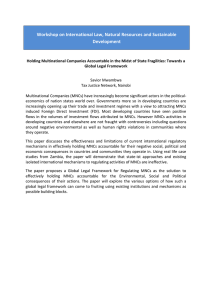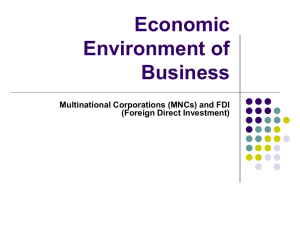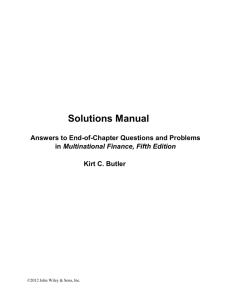Unit 5 Global Companies Meaning of Global Companies (MNCs)
advertisement
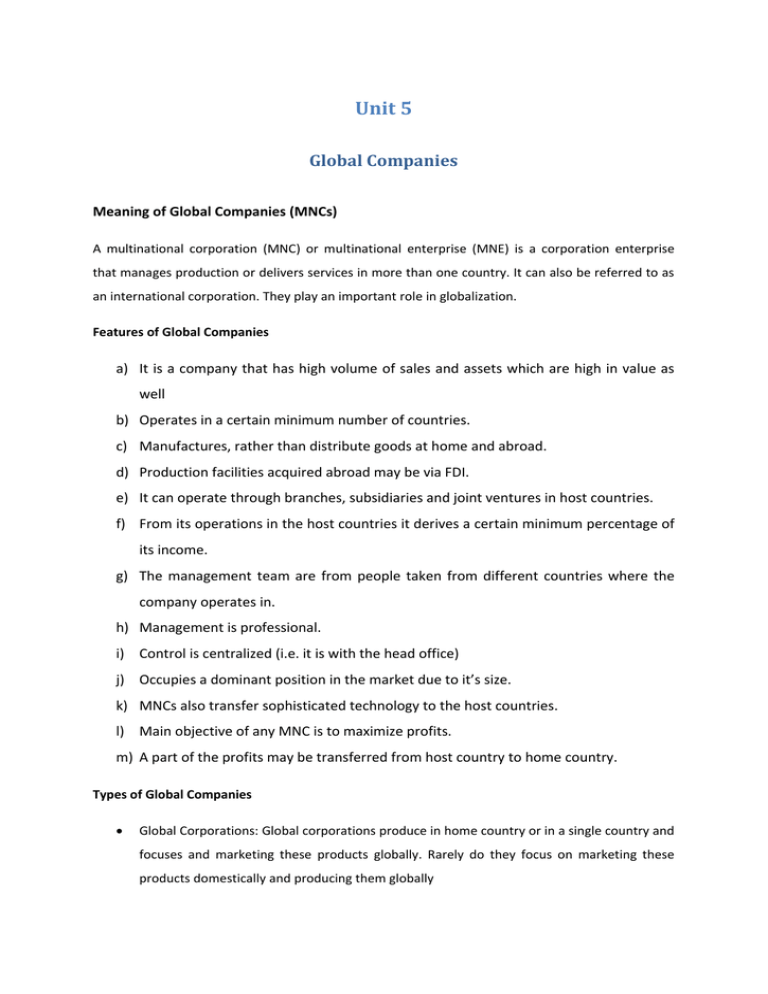
Unit 5 Global Companies Meaning of Global Companies (MNCs) A multinational corporation (MNC) or multinational enterprise (MNE) is a corporation enterprise that manages production or delivers services in more than one country. It can also be referred to as an international corporation. They play an important role in globalization. Features of Global Companies a) It is a company that has high volume of sales and assets which are high in value as well b) Operates in a certain minimum number of countries. c) Manufactures, rather than distribute goods at home and abroad. d) Production facilities acquired abroad may be via FDI. e) It can operate through branches, subsidiaries and joint ventures in host countries. f) From its operations in the host countries it derives a certain minimum percentage of its income. g) The management team are from people taken from different countries where the company operates in. h) Management is professional. i) Control is centralized (i.e. it is with the head office) j) Occupies a dominant position in the market due to it’s size. k) MNCs also transfer sophisticated technology to the host countries. l) Main objective of any MNC is to maximize profits. m) A part of the profits may be transferred from host country to home country. Types of Global Companies Global Corporations: Global corporations produce in home country or in a single country and focuses and marketing these products globally. Rarely do they focus on marketing these products domestically and producing them globally International Corporation: They conduct the operations in one or more foreign countries with domestic orientation. This company believes that the practices adopted in domestic business, the people, and products of domestic business are superior to that of the other countries Multinational Corporation: The Company responds to the specific needs of the different country markets regarding product, price and promotion. Even though the MNC operates in more than one country, it operates like a domestic company of the country concerned. Transnational Corporation: they produce market and invest and operate across the world. They have common hiring policies and also share their R&D with their other business operations all over the world. Administration of Global Companies a. Expansion of Market Territory: growth of various economies along with growth in GDP and rise in per capita income resulted in the rise in the living standards. These factors have contributed towards the expansion of market territory. b. Market Superiorities: MNCs enjoy a lot of market superiorities compared to domestic companies, these include: i) Availability of more reliable and up to date information ii) Market reputation iii) Face difficulties in marketing the products iv) Adopt more effective advertising and sales promotion techniques. v) They enjoy quick transport and warehousing facilities. c. Financial Superiorities: MNCs enjoy a lot of financial superiorities compared to domestic companies, these include: i) Huge financial resources are available which can be used for turning the environment and circumstances in their favour. ii) Funds can be used more effectively and economically as excess funds can be used to meet demands of the countries where they operate. iii) Easy access to external capital markets iv) Mobilize different types of resources of high quality. v) They can have access to international banks and financial institutions. d. Technological Superiorities: MNCs are invited by developing countries mostly due to technological backwardness of these countries. The developing economies regard the transfer of the technology from the MNCs as a useful account due to the following reasons: i) Industrialization is backward in developing countries. The resources available in developing countries are insufficient to develop the technology and thereby industrialization. ii) Developing countries are generally rich in resources and are unable to utilize them effectively due to the poor availability of financial resources. iii) Manpower, materials and capital is not used effectively in developing countries. MNCs when they enter these countries help them exploit these resources optimally. iv) Developing countries import resources, thus requiring large amounts of foreign exchange. MNCs are able to bring foreign exchange resources into these countries by their operations. v) Developing countries are unable to market their products n services, thus making them invite MNCs into their soil. e. Product Innovation: MNCs operate in several countries, the collect market information on their customers regarding what are their likes, tastes and preferences. MNCs usually have strong R&D Dept that creates products for the developing markets.
